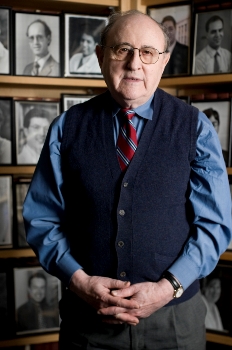Given his track record, we should pay attention when physician Bernard Lown warns of a global threat that has the potential to alter our lives drastically.
As a Harvard cardiologist, Dr. Lown first came to prominence for his pivotal role in the early 1960s in developing the defibrillator, which uses an electrical charge and has restored the heartbeats of countless thousands of patients worldwide.
Shortly afterward, he delivered an even bigger shock by engaging top medical and public health experts in a numbers-crunching analysis of what would actually happen to the Boston area in the unthinkable event of a nuclear attack. Their resulting landmark article in the New England Journal of Medicine projected the nightmarish impact an attack would have on the city's health care infrastructure. It helped establish the prevention of nuclear war as an urgent priority for public health.
On behalf of concerned American and Soviet physicians, Lown would later accept the Nobel Peace Prize for his work in that cause.
With powers of perception and persuasion undimmed by his 91 years, Dr. Lown has just issued a jeremiad on the hazards of denying climate change. "The planet is warming," he begins. "Facts are marching in battalions, their steps in cadence, their destination known." Reeling from the Frankenstorm that battered the U.S. east coast last fall, he asks, "Is any sector of our government preparing for the likes of Sandy multiplied a thousandfold?"
While not identical, nuclear warfare and climate change are in a sense analogous. Both pose an existential threat to life as we know it. Both perils resulted from the reckless proliferation of very lucrative technologies, without an honest public accounting of the repercussions. And both hover over humanity as dark storm clouds that portend far-reaching devastation, and that never seem to leave the firmament above us.
In his latest essay, Dr. Lown focuses on our peculiar, ostrich-like capacity to ignore a clear and present danger. In the case of global warming, he sees many influences colluding in this denial. Why did the prominent journalists who conducted last fall's four presidential and vice-presidential debates fail to raise the topic of climate change even once? It took Bloomberg Businessweek, owned by the mayor of a city greatly distressed by Sandy, to proclaim on its cover: "It's Global Warming, Stupid".
Although science always will, and should, debate details, the central truths about climate change are well-established. The earth's atmosphere is getting warmer mainly due to human-driven greenhouse gas emissions and, if unchecked, the resulting disruption to weather and other climate patterns will inflict much damage and pain.
That finding was accepted by 97% of experts surveyed in a 2010 study published by the National Academy of Sciences, the preeminent scientific body of the United States. It largely mirrors an earlier statement by the UN's Nobel Prize-winning Intergovernmental Panel on Climate Change.
It's hard to imagine a stronger consensus among scientists, whose stock in trade is to question and test everything. And yet, public belief in climate change has actually declined in recent years, even as the incidence of extreme weather events, from heat waves to hurricanes, has accelerated before our eyes.
This cognitive dissonance is not accidental, as reported on PBS last October in a Frontline investigation, "Climate of Doubt". The plotline of climate denial follows the tobacco industry's disinformation campaign to foster an ambience of ambiguity around the health dangers of smoking, at a time when medical science had long recognized that cigarettes can cause fatal illness.
The monied interests that stand to lose a fortune by enactment of climate-protection policies are the oil, gas and coal companies, whose products massively pump heat-trapping gases into the environment. Through extensive funding by these fossil fuel interests, dissenting voices at the extreme margins of credible science are given a disproportionate megaphone, loudly sewing the seeds of climate doubt. And a consequence of doubt is inaction.
"Two questions have perturbed me," notes Bernard Lown. "Do these tycoons have no moral center? And are they not inhabiting the same endangered planet?"
And Dr. Lown points to another factor in what he calls "Americans' blindness and thumb-twiddling about climate change." It's our societal addiction to over-consumption, practiced in our individual lives. It has often been noted that Americans comprise 4% of the world's population, yet we use up about 40% of the earth's resources. This figures in climate change because a pattern of devouring resources with abandon leaves a giant and unsustainable environmental footprint.
The powerful psychological techniques of our marketing culture and our instant gratification media technologies have converged into a perfect storm of climate confusion. Says Lown, "the public is short in attention span, long on amnesia, devoid of a sense of history, disoriented as to geography, ever ready to be bamboozled with banalities and absurdities".
As someone who has carefully studied the impact of a horrific assault on the Boston area, where he still lives, perhaps Bernard Lown derives some solace from a statement this week by the office of Thomas Menino, the mayor of Boston, which managed to dodge most of Sandy's fury last fall. The mayor announced "new planning and policy initiatives to better prepare Boston for Hurricane Sandy-like storms and other effects from the changing climate."
Check out Dr. Lown's essay: http://bernardlown.wordpress.com/2013/01/27/441/
